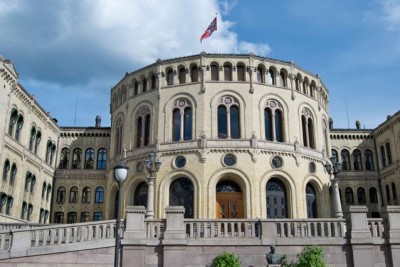The leader of one of the Norwegian government’s two support parties is calling for an extraordinary session of Parliament to tackle the refugee crisis. The Parliament isn’t due to reconvene until early October, nearly a month after municipal elections on Monday, and Liberal Party leader Trine Skei Grande thinks that’s too long to wait for emergency measures needed now for handling all the refugees arriving in Norway.

Norwegian Broadcasting (NRK) reported Monday morning that Grande has asked Prime Minister Erna Solberg to “take the initiative for an extraordinary meeting” of Parliament, so that the government can obtain broader authority to exceed current budget limitations if necessary.
“We’re prepared to go far in finding good budget solutions (to finance refugee assistance measures),” Grande said. The goal, according to Grande, is to take care of refugees arriving in Norway “in a good manner,” at a time when police are struggling to keep up with demand for new registrations of asylum seekers and Norway’s asylum centers themselves are packed.
Finding room at the inn
Ordinary Norwegians have been turning out by the thousands to help feed, clothe and house refugees. Businesses have also been donating millions of kroner while officials scramble to find shelter for the arriving refugees. The city of Oslo confirmed over the weekend that it will quickly reopen the Ila hybelhus, a former complex of small apartments used for housing drug addicts, so that it can house refugees. Newspaper Aftenposten reported that the city is poised to offer 168 rooms for refugees at Ila and two other institutions at Bekkelaget and Montebello in Oslo, while more space may be arranged at the Stubljan campgrounds and in barracks at Klemetsrud.
Hotel owner Petter Stordalen also offered both rooms and meals for refugees at his Quality Airport Hotel Gardermoen, either at cost price to the city or simply as a donation to a national effort to help with accommodation. Stordalen said he was prepared to offer additional lodging and that he was donating to relief efforts through UNICEF. Both Amnesty International and the Red Cross welcomed Stordalen’s initiative, but others criticized him for considering compensation demands in the amount of NOK 650 (USD 80) per asylum seeker per day at the airport hotel. Stordalen responded via Aftenposten that he hadn’t sent any bills yet.
Split government united on more aid next year
Foreign Minister Børge Brende of the Conservatives and Finance Minister Siv Jensen of the Progress Party said on Sunday, meanwhile, that their coalition government planned to boost the state budget allocation for humanitarian aid by nearly NOK 1 billion next year. A “considerable portion” of the money will go towards helping Syrian refugees, they said, with Jensen claiming it was “absolutely necessary” to strengthen humanitarian aid both within war-torn Syria and to refugees in neighbouring countries.
Jensen, however, has seen her Progress Party’s standing tumble again in recent public opinion polls, as its generally restrictive policies towards asylum and immigration fail to draw support in the run-up to the municipal election on September 14. The government coalition has been split on the refugee issue, with Jensen herself urging local governments to refuse to take in more refugees while Brende and Prime Minister Solberg of the Conservatives are adopting a softer line. The grass roots movement “Refugees Welcome to Norway” has been a direct reaction against the Progress Party’s policies and its Justice Minister, Anders Anundsen, drew little support over the weekend for an appeal to send more underaged asylum seekers out of Norway. That won’t happen, Solberg said on Sunday, especially after several other opposition parties in Parliament strongly protested Anundsen’s appeal.
“I can’t understand why this (Anundsen’s) appeal came now, when we see what’s also happening elsewhere in Europe,” said Geir Toskedal, responsible for immigration policy for the Christian Democrats, the government’s other support party in Parliament. He said his party would instead fight for better accommodation for the record numbers of young refugees arriving in Norway on their own. And while Anundsen’s justice ministry had asked immigration officials to find ways of sending more underage refugees out of Norway, Solberg said her government would instead “concentrate on handling the large numbers arriving in the best possible way.” The thousands now arriving come in addition to the 8,000 UN-registerered refugees that Parliament agreed in June to take in.
‘No regrets’
Jensen, meanwhile, has refused to rein in Anundsen and has said she has no regrets that she has encouraged local communities to refuse to accommodate new refugees. She still claims the asylum wave “will create problems” for Norway’s social welfare state, although she commended those offering direct assistance to the hungry, desperate people arriving every day.
She claimed she also had been moved by the photos of desperate refugees, and those who die trying to flee war and Islamic extremism. “But it’s not so that all of Norway suddenly thinks it’s fine to open all the gates,” Jensen told news bureau NTB over the weekend. “We are already taking part of the burden. The crisis won’t be solved if we liberalize regulations.”
Kjetil B Alstadheim, political commentator for newspaper Dagens Næringsliv (DN), wrote Monday about how Jensen’s party has only registered an average 10.9 percent of the vote in recent polls, down from the 16.3 percent the Progress Party won in the last national election two years ago. The party’s longtime strategy of “playing the immigration card” in election campaigns, and appealing to Norwegians’ alleged fear of foreigners, thus doesn’t seem to be working this time. Some of the party’s own top politicians have said this year’s municipal elections can function as a sort of referendum on the refugee issue, which they’re now faced with losing.
newsinenglish.no/Nina Berglund

